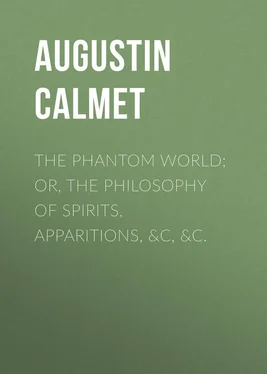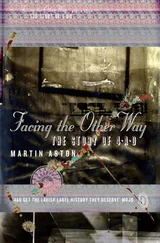"Vipereas rumpo verbis et carmine fauces." — Ovid .
Plin. lib. xxviii.
The fables of Jason and many others of the same class are said by Fortuitus Comes to have a reference to alchemy.
Aug. de Civit. Dei, lib. xviii. c. 16-18.
Frederici Hoffman, de Diaboli Potentia in Corpora, p. 382.
See John Schesser, Laponia , printed at Frankfort in 4to. an. 1673, chap. xi. entitled, De sacris Magicis et Magia Laponia , p. 119, and following.
Plin. lib. iii. c. 2.
Philost. Vit. Apollon.
Lactant. lib. vi. Divin. Instit. c. 13.
Aug. ad Simplic.
Tertull. de Animâ, c. 57.
Lucan. Pharsal. lib. vi. 450, et seq.
"Cessavere vices rerum, dilataque longa,
Hæsit nocte dies; legi non paruit æther;
Torpuit et præceps audito carmine mundus;
Et tonat ignaro cœlum Jove."
"Cantat et e curro tentat deducere Lunam
Et faceret, si non æra repulsa sonent."
Tibull. lib. i. Eleg. ix. 21
Pietro della Valle, Voyage.
"… Obscurum verborum ambage nervorum
Ter novies carmen magico demurmurat ore.
Jam ciet infernas magico stridore catervas,
Jam jubet aspersum lacte referre pedem.
Cùm libet, hæc tristi depellit nubila cœlo;
Cùm libet, æstivo provocat orbe nives."
Ovid. Metamorph. 14.
"Naïs nam ut cantu, nimiumque potentibus herbis
Verterit in tacitos juvenilia corpora pisces."
"Vipereo generi et graviter spirantibus hydris
Spargere qui somnos cantuque manque solebat,"
Plin. lib. viii. c. 48.
Herodot. lib. ix.
Vide Joan. Marsham, Sæc. iv. pp. 62, 63.
Pausan. lib. vii. p. 141.
Homer, Iliad, xii. 2, 235.
Herodot. lib. ii. c. 52, 55.
Exod. xxv. 22.
Deut. xviii. 13.
2 Kings i. 2, 3, 16, &c.
1 Sam. xiv. 24.
Deut. xiii. 1, 2.
Isaiah xli. 22, 23.
Tertull. Apolog. c. 20.
Hieronym. in Dan.
Matt. xxiv. 11, 24.
Jonah i. 2.
2 Kings xx. 1. Isai. xxxviii. 1.
Numb. xxii. xxiii. xxiv.
Numb. xxxi. 8.
Aug. de Divinat. Dæmon. c. 3, pp. 507, 508, et seq.
Idem. c. 5.
S. August. in his Retract. lib. ii. c. 30, owns that he advanced this too lightly.
Porphr. apud Euseb. de Præpar. Evang. lib, iv. c. 5, 6.
Plutarch, de Defectu Oracul. p. 434.
Macrob. Saturnal. lib. i. c. 23.
Lettres édifiantes, tom. x.
Cicero, de Divinat. lib. ii. c. 57.
"Reges timent futura
Et superos vetant loqui."
Lucan , Pharsal. lib. v. p. 112.
Strabo, lib. xvii.
Joan. Vier. lib. ii. c. 7.
A remarkably fine print on this subject was published at Paris some years ago; if we remember right, it was suppressed.
Horat. Epodon. xviii. 4.
"Quædam sceleratæ mulieres dæmonum illusionibus et phantasmatibus seductæ, credunt se et profitentur nocturnis horis cum Dianâ Paganorum deâ et innumerâ multitudine mulierum equitare super quasdam bestias et multa terrarum spalia intempestæ noctis silentio pertransire ejusque jussionibus veluti dominæ obedire." – Baluz. Capitular. fragment. c. 13. Vide et Capitul. Herardi, Episc. Turon.
Agobard de Grandine.
Vide Baluzii in Agobard. pp. 68, 69.
Fleury, Hist. Eccles. tom. xvii. p. 53, ann. 1234.
Alphons. à Castro ex Petro Grilland. Tract. de Hæresib.
Bolland, 5 Jul. p. 287.
Causes Célèbres, tom. vi. p. 192.
Job i. 12, 13, 22.
2 Cor. xii. 7, 8.
John xiii. 2.
Matt. xxiv. 5.
Luke xxi.
The attentive reader of this horrible narrative will hardly fail to conclude that Gaufredi's fault was chiefly his seduction of Mademoiselle de la Palud, and that the rest was the effect of a heated imagination. The absurd proportions of the " Sabbath " bell will be sufficient to show this. If the bell were metallic, it would have weighed many tons, and a wooden bell of such dimensions, even were it capable of sounding, would weigh many hundred weight.
Matt. iv. 5.
Dan. xiv. 33, 34. Douay Version.
Acts viii. 40.
Joan. Diacon. Vit. Gregor. Mag.
Lettre de M. G. P. R., 5th October, 1746.
On the 26th of May, of the Bollandists, c. xx. n. 356, 357.
Acta S. J. Bolland. 3 Jul. p. 95.
Ibid. 31 Jul. pp. 432, 663.
Acta S. J. Bolland, 21 Aug. pp. 469, 481.
Ibid. 18 Aug. p. 503.
Ibid. 17 Aug. p. 255.
Ibid. 4 Aug. p. 405.
Vita S. Christina. 24 Jul. Bolland. pp. 652, 653.
Nicole, tom. i. Letters, pp. 203, 205. Letter xlv.
Vita Sancti Dunstani, xi. 42.
It is worthy of remark, that in the cases which Calmet refers to of persons in his own time, and of his own acquaintance, being thus raised from the ground, he in no instance states himself to have been a witness of the wonder.
Petrus Venerab. lib. ii. de Miraculis, c. 1, p. 1299.
1 Sam. xvi. 23.
Читать дальше












